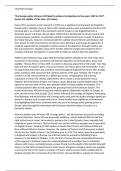Charlotte Corrigan
‘The foreign policy of Henry VIII failed to achieve its objectives in the years 1509 to 1547’.
Assess the validity of this view. (25 marks)
Henry VIII’s ascension as the monarch in 1509 was a significant turning point for England’s
foreign policy. Notably, many of Henry VIII’s foreign policies were prompted by his thrust for
personal glory, as a result of his narcissism and his hunger to see England become a
dominant power in Europe, akin to Spain. Whilst Henry did attempt to remain neutral with
some European countries, he primarily wanted to expand into France in order to preserve
the Tudor Dynasty. However, his break with the Catholic Church (Rome) and Wolsey’s fall
from power in 1529, forced Henry to become more defensive and change his approach. It
could be argued that he managed to achieve some of his objectives through treaties, but
this was temporary. Notably, many of his treaties failed to change and resulted in the re-
invasion of Europe. On balance, it seems that he failed to achieve all of his objectives.
Whilst many Historians may argue that the foreign policies adopted in his early reign were
successful on the surface and Henry achieved his objectives of personal glory, peace and
stability. Thomas More in May 1509, in a letter to Erasmus about Henry VIII wrote: ‘Our King
does not wish for gold or gems or precious stones, but virtue, glory and immortality’. It can
be argued that that there was a positive mood throughout England that Henry VIII’s foreign
policy marked a shift away from the cautious policies of the past. Notably, the Treaty of
London in 1518, was perceived as a ‘glittering success’, bringing glory and a strong
reputation to Henry VIII. Wolsey aided Henry VIII to create a treaty between France,
England, the Holy Roman Empire, the Papacy, Spain, Burgundy and the Netherlands. They
agreed to aid each other if they were attacked which created stability for England. This
created powerful allies to help against the growing threat of the Ottoman Empire. The
treaty made Henry VIII look strong and ended England’s diplomatic isolation in Europe. In
turn, this led to the cloth of gold, 1520, which enhanced the prestige of England, illustrating
that diplomacy enhanced Henry VIII’s foreign policy and gave him kudos amongst significant
powers in Europe such as Spain and France. These treaties were significant achievements
that highlighted that Henry achieved some success in his foreign policy gaining power in
Europe, glory through his arbitration and his action raised the status of London as a
European capital.
War was another part of Henry VIII’s foreign policy – but this was less successful according
to some historians. Henry VIII was personally ambitious, and he believed that he had the
right to the French crown. He wanted to preserve the Tudor Dynasty. Henry arguably had
insignificant gains in France. His first French war and his military campaign was a huge drain
on English finance. Sending 10,000 soldiers to South-West France and achieved little and
they suffered defeat in Gascon. However, the capture of Tournai and Thérouanne enabled
him to win the ‘Battle of Spurs’, the following year in 1513. This victory gave him popularity
in England and respect in Europe. He achieved what he wanted by defeating France.
However, in the Battle of Flodden, 1513, the Earl of Surrey became outnumbered because
of the support in Scotland. James IV invaded England and was killed. Due to Scotland’s
alliance with France, Scotland became a major threat, but the death of the Scottish King left
James V as the infant monarch but his sister Queen Margaret as Regent which was arguably
a success for Henry VIII. Henry’s invasion of France, whilst not successful, enabled him to
bargain and gain the concessions from the French. He was flexible in arguing his claim and




